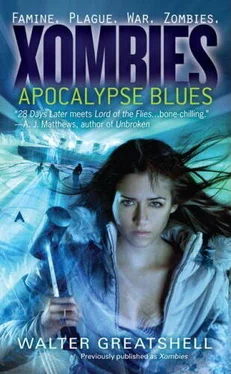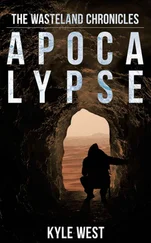Walter Greatshell - Apocalypse blues
Здесь есть возможность читать онлайн «Walter Greatshell - Apocalypse blues» весь текст электронной книги совершенно бесплатно (целиком полную версию без сокращений). В некоторых случаях можно слушать аудио, скачать через торрент в формате fb2 и присутствует краткое содержание. Жанр: Фэнтези, Триллер, на английском языке. Описание произведения, (предисловие) а так же отзывы посетителей доступны на портале библиотеки ЛибКат.
- Название:Apocalypse blues
- Автор:
- Жанр:
- Год:неизвестен
- ISBN:нет данных
- Рейтинг книги:3 / 5. Голосов: 1
-
Избранное:Добавить в избранное
- Отзывы:
-
Ваша оценка:
- 60
- 1
- 2
- 3
- 4
- 5
Apocalypse blues: краткое содержание, описание и аннотация
Предлагаем к чтению аннотацию, описание, краткое содержание или предисловие (зависит от того, что написал сам автор книги «Apocalypse blues»). Если вы не нашли необходимую информацию о книге — напишите в комментариях, мы постараемся отыскать её.
Apocalypse blues — читать онлайн бесплатно полную книгу (весь текст) целиком
Ниже представлен текст книги, разбитый по страницам. Система сохранения места последней прочитанной страницы, позволяет с удобством читать онлайн бесплатно книгу «Apocalypse blues», без необходимости каждый раз заново искать на чём Вы остановились. Поставьте закладку, и сможете в любой момент перейти на страницу, на которой закончили чтение.
Интервал:
Закладка:
"… Excuse me?"
"We need you to flush out one of them for us. See if your plan worked. Charley, put a tank on her, will ya?" A man came forward bearing a stubby yellow oxygen tank.
"Alone?" I asked. I was thinking, This is a joke.
"We can't all go. What if it didn't work? We need somebody to test the waters."
I looked around at their tired faces, some mocking, some troubled. Cowper's was the most indifferent, and for that I carelessly shouldered the heavy tank, saying, "Okay. Where to?" At that moment I would have jumped off a cliff to spite him.
"You see that door there?" To the others he said, "The rest of you tend goal and make damn sure nothing gets in."
There was a brief interruption of my airflow as Albemarle switched the line. Kranuski handed me a walkie-talkie. "Lulu, take this radio and leave it on talk, like this, so we know how you're doing. You've got twenty minutes of air, but start heading back after fifteen. You won't even need that much time. Just go forward to the radio shack and come back. It's a straight shot; you can't get lost."
It was strange to have him call me Lulu, like he thought he had to be chummy with the condemned. "Louise," I muttered.
He either didn't hear or ignored me. "You ready?" he asked.
"Just hurry up."
Cowper signaled them to turn the wheel, which looked like a bank vault. Robles kicked the door outward, gun at the ready. I pictured a wall of water on the other side, water that became a white horizontal column, blasting these people down and drowning them so that they drifted about the flooded green room like wide-eyed statues with flowing hair. But nothing came through.
Robles patted me on the shoulder. Without irony, he said, "Hey, good luck." Other voices also chimed, "Good luck," and someone said, "Rock on."
I stepped in over the raised sill and helped them close it behind me.
Standing with my back to the door, breathing bottled oxygen, my first inane thought was, Call Control Data Institute-Today! I was in a tight passage through ceiling-high racks of electronics, enveloped in their soft refrigerator hum. The floor was dirt-concealing flecked beige tile. Those aisles would have been just the place to conceal lurking Xombies, too, but none appeared.
For a second, I was leery about giving myself away by speaking into the radio, but as I made myself start walking it came naturally. Talking made me feel less alone.
"Nothing so far," I said, more loudly than necessary. "I'm passing rows of computer equipment… checking all the doors. Nope. Now I'm passing under an escape trunk-it's closed. I'm looking into a room full of TV monitors and consoles-hello? Nobody there. Now a smaller room… the ceiling's getting low…"
I was at the end. This last room had the cramped, utilitarian look of a place behind the scenes-the front of the sub, I supposed. It was festooned with thick skeins of insulated cable that clung to the bulkhead like fossilized muscle and sinew. Fax machines and other communications gear were stuffed wherever they could fit amid gray-painted guts of ducts, pipes, wiring. Teletype paper had been dumped on the floor, but otherwise there was nothing there.
Feeling let off the hook, I dawdled to peer in every cranny. I still had fifteen minutes. What interested me was that I could see part of the actual hull there-that curved ceiling was all that kept the sea out. I noticed that the inner walls and floor did not actually contact the hull, but seemed to float within it, creating a crawl space on all sides, as if the living and work areas of the sub were a clunky, angular structure shoehorned inside the ringed shell-a ship in a bottle. It dawned on me that I had seen all this in pieces back at that great hangar. It had been a submarine factory. Duh, as the boys would say.
Crawl space. A chunky yellow flashlight hung from a hook in the corner. I took it and performed a few contortions with the tank on my back, struggling to peer into the narrow crevice along the hull.
Faces looked back at me.
I flinched, nearly dropping the flashlight. I must have cried out, too, because Cowper would later tell me that he and the other fellows in the control room thought I had "bought it." But the faces didn't move. They had stopped like clocks.
Years ago, when Mum and I were still living in our old house in Oxnard, California, I had wormed my way through a mysterious trapdoor above the closet into a tiny neglected attic. Crouched on the ledge, I flicked on my flashlight and found myself surrounded by basketball-sized hornets' nests… papery-dry and long dead. This was much the same.
Mesmerized by something gleaming in the dark, I sighed and banged the radio against my mask, forgetting it was there. "It worked," I said. Then I turned off the flashlight so I could no longer see the boy's gold tooth.
CHAPTER TEN
No matter how squeamish you are, getting rid of bodies breaks down to a job of heavy lifting. The novelty of cool, rigid flesh wears off, and you realize how awkward they are to move, how darn heavy. After a dozen or so, they're no more fearsome than the baggy old futons my mother always made us drag from apartment to apartment. "Come on, lazypants," she would cry, as I buckled under my half. "Nearly home!"
Finding every Ex was a grotesque Easter egg hunt, made more difficult by our breathing equipment in the tight spaces. Since operating the boat took precedence, corpse-gathering was relegated to the boys and me, under the supervision of a whiskery old character named Vic Noteiro. He knew every possible place to check, and was perfectly happy to let us do the checking while he made himself comfortable and told anecdotes about his days painting submarines. "Guys kept sayin' I should retire," he said. "Retire from what? Sittin' on my ass all night listening to the radio? Makin' twenty bucks an hour? Whenever ya feel like it, ya slap on a coat of Mare Island? Pure titty."
Then the question was how to dump them overboard. No one knew if exposure to air would cause them to revive, but we didn't want to find out, even if it meant we had to "suck rubber" awhile longer. In the meantime the bodies were weighted, bagged, and trussed like mummies. That was awful because they had lost their blue pallor and looked vibrantly alive-much more rosy-cheeked than any of us. "It's the carbon monoxide is all," Vic told us dismissively. "They're stone dead."
A skeptical-faced boy asked, "How can the carbon monoxide affect them if they don't breathe?"
"Who said they don't breathe? They breathe. They're like plants: They absorb what they need through every pore. No actual respiration, but they do breathe-just a lot slower, like them yogis in India. For all we know, they're in Nirvana now."
There were fourteen Xombies altogether-ten from the crew (actually twelve crew members had been lost, but two conveniently fell into the sea), the two Marine guards, and two from our crowd. When we had them all lined up in the big mess hall, Kranuski and Cowper came down to look. Vic had identified each one with a Magic Marker, and a man named Kraus ticked them off one by one: "Boggs, supply officer; Lester, weps; Gunderson, the nav; Montoya, communications; Lee, sonar chief; Baker, cob; Henderson, quartermaster; Selby, machinist's mate; O'Grady, torpedoman-" He faltered, clearing his throat. "Shit."
"I know," said Cowper. "When you've worked with a man, it's hard."
Kranuski snapped, "It's not that. What about the tubes?"
Cowper nodded carefully, as if treading on shaky ground. "I was thinking of that. Will your people accept it?"
"It's burial at sea. Better than dumping them down the TDU."
"Okay. I'll make an announcement-"
"No announcement. Sorry, sir, but you're the one who told me not to get hung up on ceremony. Let's just get this over with."
Читать дальшеИнтервал:
Закладка:
Похожие книги на «Apocalypse blues»
Представляем Вашему вниманию похожие книги на «Apocalypse blues» списком для выбора. Мы отобрали схожую по названию и смыслу литературу в надежде предоставить читателям больше вариантов отыскать новые, интересные, ещё непрочитанные произведения.
Обсуждение, отзывы о книге «Apocalypse blues» и просто собственные мнения читателей. Оставьте ваши комментарии, напишите, что Вы думаете о произведении, его смысле или главных героях. Укажите что конкретно понравилось, а что нет, и почему Вы так считаете.











